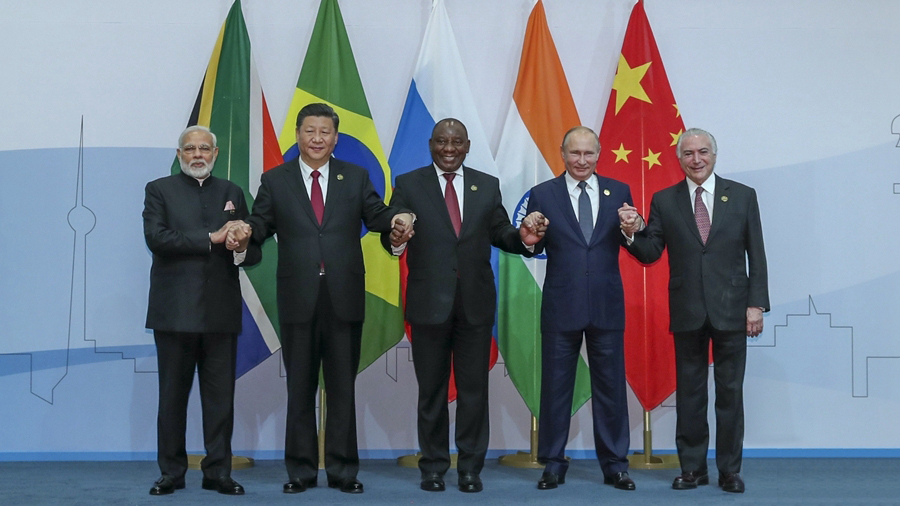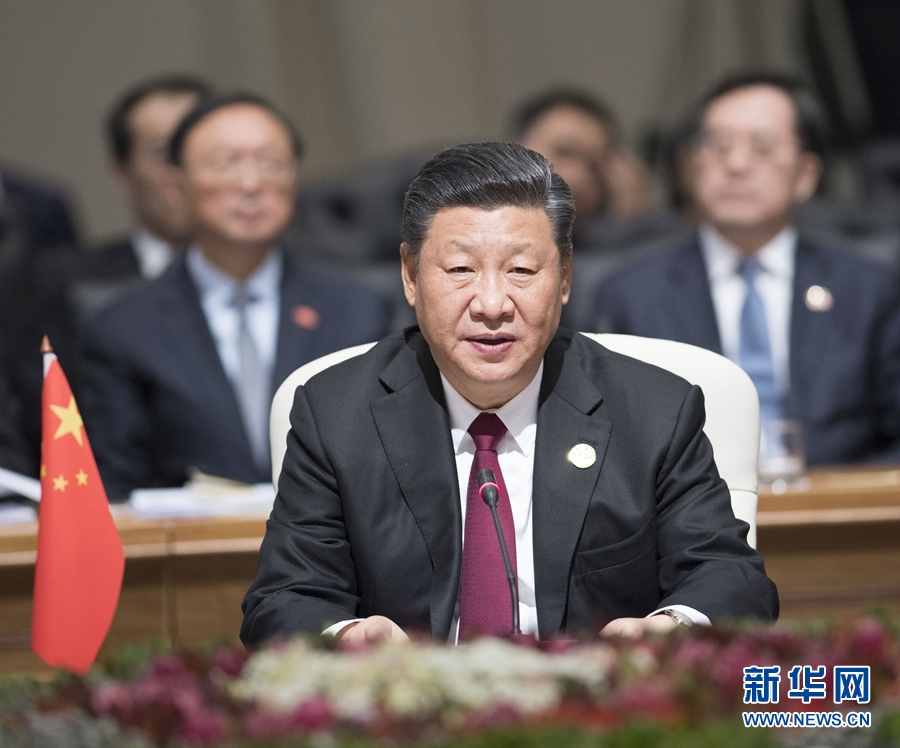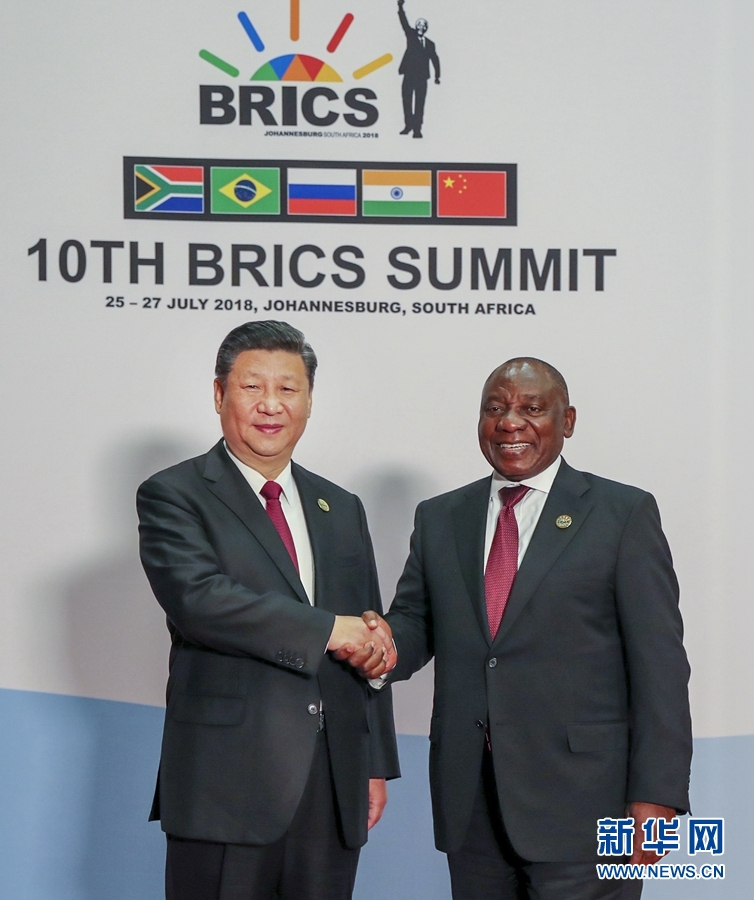
Opinions
11:25, 27-Jul-2018
Opinion: Analyzing Xi Jinping’s speech at Johannesburg BRICS Summit
Updated
11:17, 30-Jul-2018
B R Deepak

Editor's note: B R Deepak is a professor at Center for Chinese and Southeast Asian Studies, Jawaharlal Nehru University. The article reflects the author's opinion, and not necessarily the views of CGTN.
This is the sixth BRICS summit President Xi Jinping is attending. We notice that he has been consistently advocating for the "BRICS Spirit" of cooperation and partnership with values such as mutual trust, mutual respect, and equality at its core.
His advocacy for an equitable and just international order, an open and inclusive multilateral trading system, common development, prosperity, and security has been consistent all these years.
Xi has pitched for robust people-to-people exchanges and respect for diverse civilizations, for he is of the conviction that humankind has learned that civilization exchanges adhere to the free flow of peoples, ideas, technologies, and commodities rather than preaching protectionism, nativism, populism, and exclusion.
During the present summit, while addressing the BRICS Business Forum at the 10th BRICS summit in Johannesburg, President Xi suggested win-win cooperation, innovation, inclusive growth and multilateralism for common development in BRICS countries.
Win-win cooperation is possible if the countries open up their economies for greater trade and investment rather than adhering to the practices of unilateralism and protectionism, and let the people of the world, especially those from the developing countries, reap the benefits.

Chinese President Xi Jinping delivers a speech titled "Keeping Abreast of the Trend of the Times to Achieve Common Development" at the BRICS Business Forum in Johannesburg, South Africa, Jul 25, 2018./Xinhua Photo.
Chinese President Xi Jinping delivers a speech titled "Keeping Abreast of the Trend of the Times to Achieve Common Development" at the BRICS Business Forum in Johannesburg, South Africa, Jul 25, 2018./Xinhua Photo.
In recent years, protectionism and unilateralism have crept across the world and has disrupted the existing regional and international order, thus creating or intensifying contradictions and conflicts among the people and nations.
These political approaches disrupt multi-polarity in a highly interdependent global economic order, promulgate hegemony and the containment of others, and engage themselves in zero-sum games.
It was in this context that President Xi, during his speech, hit hard on the tariff barriers and trade wars. He made it clear that the world faces “a choice between cooperation and confrontation,” for the “unilateralism and protectionism are mounting, and dealing a severe blow to multilateralism and the multilateral trading regime.”
Though he acknowledged that the current international order is not just, equitable and a perfect one, he argued that “as long as it is rule-based, aims to be equitable and pursues win-win outcomes as its goal, such an international order should not be discarded at will, still less should it be dismantled and rebuilt all over again."
In the last “golden decade” of the BRICS, the grouping has been instrumental in driving the world economic growth, contributing almost 50 percent and continues to do so.
The Intra-BRICS trade has jumped to over 700 billion US dollars. This is significant when the world economic growth has been pegged at just over 2 percent and the economic recovery in most of the Western countries are weak.
According to President Xi, the next "golden decade" will be a crucial one in which new global growth drivers will take the place of old ones.
It is in this context that the industrial revolution 4.0 has been made an integral part of the next “golden decade” of the BRICS. It would be based on the integration of smart processes where big data, quantum computing and artificial intelligence, etc., will be instrumental to development.
Though the processes throw huge challenges to countries with massive labor forces, it also provides ample opportunities to the grouping where industrialization, informatization, urbanization, and modernization of agriculture could take a quantum leap.
China certainly has made huge inroads in the above fields and hence it becomes pertinent that the development strategies of the grouping are docked together for common development.
Finally, President Xi Jinping assured that China will continue to develop itself with its door wide open, build a more investment-friendly environment, strengthen protection of intellectual property rights, increase imports, and vigorously pursue the Belt and Road Initiative to create new opportunities of social and economic development.

Chinese President Xi Jinping meets Cyril Ramaphosa, the president of South Africa, in Johannesburg, South Africa, July 26, 2018. /Xinhua Photo.
Chinese President Xi Jinping meets Cyril Ramaphosa, the president of South Africa, in Johannesburg, South Africa, July 26, 2018. /Xinhua Photo.
The Belt and Road Initiative particularly can play an extremely important role, for this is China’s global rebalancing in terms of trade and investment, global governance, and civilizational interface.
Since the bonding of peoples is one of the principles of the BRI, it will result in greater bonding and conflict resolution, for peace built on politics and economics is incomplete without dialogue between the people and civilizations.
China's experience over the last 40 years would be an eye-opener to BRICS as to how China dealt with the “three rural issues,” which is connected to raising the income of peasants and providing them with public goods and necessary skills, health and education, especially in vocational education.
How did the benefits trickle down to the lowest level? How did China materialize some of the social development plans such as the universal compulsory education up to grade 9, rural medical cooperative system, social pension system for rural residents, and a minimum living allowance scheme? The coordination between the targeted poverty reduction programs with those of infrastructure, industrial, agriculture and social development could serve as a lesson for other BRICS countries.

SITEMAP
Copyright © 2018 CGTN. Beijing ICP prepared NO.16065310-3
Copyright © 2018 CGTN. Beijing ICP prepared NO.16065310-3